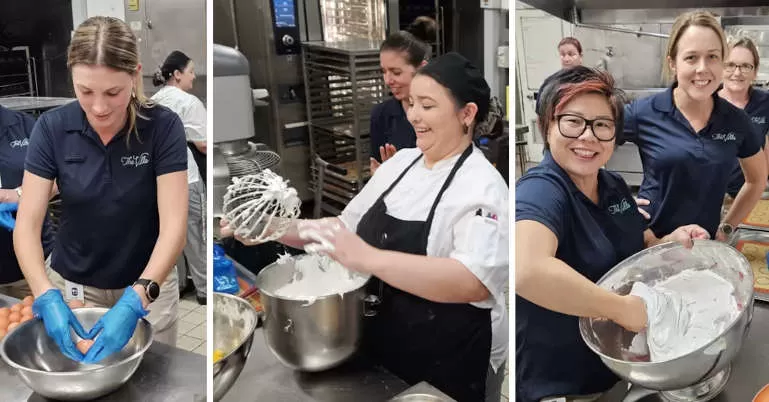Why Hospitality should be a Core Subject
As a hospitality trainer, I see many students come through my classroom each week. Some choose the subject because they love food, for others, it’s a fun break from their academic subjects, and a small percentage genuinely want to enter the industry. That’s perfectly fine. Living in a tourist area, I know many will end up working in hospitality at some point. I can relate—I thought I’d end up in Health Science, studying math’s and sciences in high school. But two years after graduating, I found myself in a Diploma of Business in Hospitality Management. At the time, I wasn’t sure where it would lead. I vividly remember telling my classmates, "I don’t want to work in a restaurant—just want to throw great dinner parties." Fast forward to 30 years of working in restaurants within 5-star resorts!
Now, I’m advocating for hospitality to be a core subject in schools. Yes, you heard me right. Not because we need better dinner parties, but because hospitality teaches essential life skills. Here’s why:
Teamwork:
There’s a reason I’ve often said, “There’s no ‘I’ in team.” A restaurant, like many other industries, relies on everyone doing their part, from the maître d’ to the dish-hand. Take one piece out, and the whole system falls apart. I remember managing a busy restaurant where the dish-hand called in sick. Everyone had to pitch in to keep things moving smoothly because without clean plates, the whole operation would grind to a halt. Teamwork is critical, whether you’re in hospitality or any other field, like education or healthcare.
Flexibility:
Hospitality workers know the value of flexibility. If a teammate calls in sick, someone has to step up. You can’t leave unfinished work and pick it up later. This adaptability is useful in all areas of life—how often have you heard, "It’s not my job"? Flexibility is key to thriving in any work environment. I remember one Saturday, I ended up in the hospital, and my husband was calling my work to tell them I was too unwell to come in. As he was making the call, I was in the background saying, "I might be ok for tonight—I'll let you know!" That’s the level of commitment hospitality often requires.
Initiative:
Using initiative is crucial in hospitality. For instance, if you overhear that it’s a guest’s birthday, you don’t wait to be told—you head to the kitchen and prepare a surprise dessert plate. It’s about anticipating needs, just like in everyday life. One time, we had a family in the restaurant celebrating an anniversary. The waitstaff and I decided to create a special celebratory dessert on the spot. That little bit of initiative made their night unforgettable. This skill can elevate any job or situation.
Emotional Intelligence:
Hospitality accepts everyone. Whether it's front-of-house staff who love a good chat, highly skilled workers from diverse backgrounds, or those with emotional challenges, you work alongside all kinds of people. Emotional intelligence helps you read others, be adaptable, and make the experience better for both colleagues and guests. I learned this the hard way when I was just 18. I was serving a customer in a pâtisserie who wasn’t speaking and only gesturing. At first, I thought he was being rude, but at the end of the purchase, he handed me a note explaining that he couldn’t speak or hear but needed some directions. That experience taught me to always be more understanding and patient.
Endurance:
Long hours and back-to-back shifts teach endurance (and the importance of good shoes!). While the industry has become more regulated, it still requires stamina. I remember working double shifts during peak seasons, getting only a few hours of sleep, and coming back to do it all over again. This is great preparation for the ultimate endurance test: parenthood, little unpaying guests who require constant food and beverage at all hours.
Attention to Detail:
From setting a table just right to preparing a dish to perfection, attention to detail is a skill that transcends industries. Whether you’re an accountant, architect, or chef, the ability to focus on the small things can make all the difference. I spent years teaching new staff how to fold napkins properly and set a table perfectly, which might seem minor, but these little things contribute to the overall guest experience.
Time Management/Multitasking:
Hospitality teaches you how to juggle tasks and manage your time. Knowing which customer needs to prioritize or when to call out a meal order can mean the difference between chaos and calm. On a busy Saturday night, I’ve had sections with ten tables, all needing attention at once. You learn quickly how to prioritize who needs their drink topped up, who’s ready for their main course, and who just needs a friendly check-in. This is a skill everyone needs, regardless of their career.
Respect:
Hospitality teaches respect—both for your team and for customers. It’s why, when I’m a guest, I always go out of my way to show appreciation for good service, and if things don’t go perfectly, I understand that the team is doing their best. Mutual respect is essential to creating a better community.
In conclusion, hospitality, or "life skills," should be a core subject. No matter why a student is in my class, I teach with passion and high expectations. Even if they don’t pursue hospitality, they’re gaining skills that will serve them in life—both professionally and personally.


